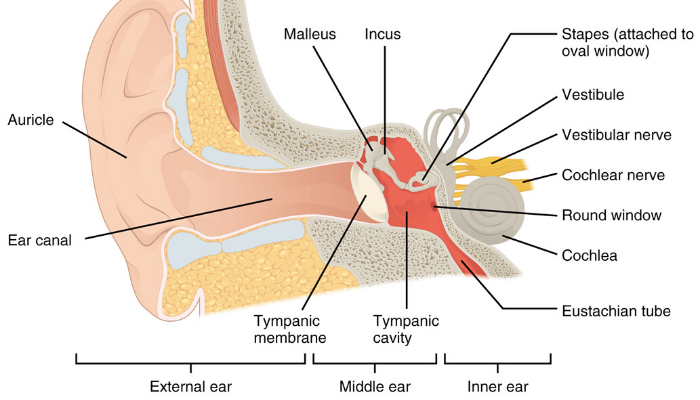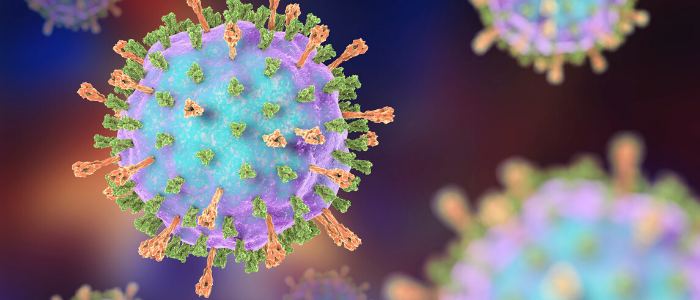What Kind Of Viruses Cause Hearing Loss?
June 16, 2020

They’re not always considered to be the culprit, but viruses are a common cause of both temporary and permanent hearing loss.
COVID-19 and hearing loss
Although further studies are required, a recent study has suggested that COVID-19 infection can result in sudden sensorineural hearing loss (SSNHL), despite the patient being asymptomatic. SSNHL occurs when there is damage to the hair cells around the cochlea, the cochlea, or the nerve pathways between the ear and the brain.
Whilst there is no concluding evidence regarding the link between COVID-19 and permanent hearing loss yet, based on the reputation of viruses and their history of causing hearing loss, it shouldn’t be ruled out.
For some viruses, like Cytomegalovirus (CMV) and Rubella (CRS), hearing loss is the most prevalent consequence, with CMV causing 40% of congenitally acquired sensorineural hearing loss and almost all patients with Congenital Rubella Syndrome suffering some degree of hearing loss.
Both congenital (occurring in the womb) and acquired hearing loss (occurring from transmitted diseases outside of the womb) may occur as a result of a viral infection such as measles, the mumps, rubella, chickenpox, and HIV. But the list doesn’t end there.
Many of these viruses can be prevented through vaccination and your GP is your first port of call when it comes to yours and your family’s immunisation. It’s important to note that if you do fall ill with a virus and then subsequently experience a sudden hearing loss (SSHNL), you should seek an immediate medical assessment as early treatment is vital to prevent or limit permanent hearing issues.
The information in this article has been drawn from NCBI’s ‘Viral Causes of Hearing Loss: A Review for Hearing Health Professions’. You can learn more about the different kinds of hearing loss in our previous blog post.
Why do some viruses cause hearing loss?
Viral infections can impact the auditory nerve in the cochlea, blood vessels in the ear, or other parts of the body that are linked to hearing. Depending on the virus, the kinds of damage that can occur include:
• direct damage to the inner ear
• the virus induces inflammatory responses, which then cause damage to the ear
• the virus causes increased susceptibility to bacterial or fungal infections, which can lead to hearing loss

Viruses typically cause sensorineural hearing loss, however, conductive and mixed hearing losses can occur as a result of infection. Hearing loss from a virus can be mild to profound, unilateral, or bilateral.
In some cases, hearing loss that has stemmed from viral infections can be reverted or limited by antiviral therapy. If the loss is permanent, those suffering mild to moderate loss will benefit from hearing aids, while those with severe to profound loss may require cochlear implants.
Viruses causing Congenitally Acquired Hearing Loss
Congenital infections are caused by pathogens transmitted from a mother to her child during pregnancy. Congenitally acquired hearing loss can occur from viral infections such as CMV, Rubella, HIV, HSV1, and HSV2.
Most congenital hearing loss cases from viruses aren’t evident in the initial hearing screen and may show up 6 to 12 months after birth, so it’s important to test a child’s hearing regularly after the newborn hearing test.
At Sound Scouts, we recommend regular hearing checks for all children throughout both their early years and school years, as a hearing loss can occur at any age.
Rubella (German Measles)
Sensorineural hearing loss is the most common condition resulting from Congenital Rubella infection. A recent Brazilian study explored how Congenital Rubella was thought to be the cause of hearing loss in 32% of patients with deafness.
Rubella is a viral infection that causes a skin rash and joint pain. Although symptoms are mild for most people, if a pregnant woman contracts rubella, her baby is at risk of severe complications from the virus. Rubella is commonly transmitted through coughing, sneezing, and talking.
How does Rubella damage hearing?
Rubella causes direct damage to the cochlear, and cell death in the organ of Corti, which is composed of hair cells and nerve fibers, and Stria Vascularis, which surrounds the inner and outer hair cells.
Rubella can be avoided through vaccination, with one dose of the MMR offering 97% effectiveness at preventing the virus.
Cytomegalovirus (CMV)

CMV is common among young children less than 2 years of age and during adolescence. It rarely causes symptomatic disease in immunocompetent older infants or adults.
With the average age of diagnosis of hearing impairments in congenitally infected children at 27 to 33 months, the importance of hearing checks in the early years can’t be overstated.
How does CMV damage hearing?
Hearing loss can occur in both symptomatic and asymptomatic babies. Initial hearing screens miss the majority of cases of sensorineural hearing loss in CMV-infected children.
Research shows that CMV potentially expresses proteins that trigger an immune response leading to hearing loss and inflammation within the cochlea.
Treatment for early sensorineural hearing loss from CMV can prevent the hearing loss’ progression and sometimes also improve hearing status. There’s currently no effective CMV vaccine. Prevention of the infection in pregnant women is the best solution at this time.
Other viruses that can cause congenitally acquired hearing loss include Lymphocytic Choriomeningitis Virus (LCMV), Human Immunodeficiency Virus (HIV), and HSV types 1 and 2.
Viruses causing Acquired Hearing Loss
Acquired hearing loss occurs after birth. Common viruses that can cause acquired hearing loss include measles, Varicella-Zoster Virus (the virus that causes Chicken Pox and Shingles), and the mumps.
Measles

Hearing loss is a common complication of measles infection. Prior to widespread vaccination, measles accounted for 5-10% of cases of profound hearing loss in the United States. In areas where measles vaccination is rare, it continues to be a common cause of profound hearing loss.
Measles is an extremely contagious virus that transmits through contact with respiratory secretions from patients with measles. Symptoms of measles include fever, cough, nasal congestion, rash, conjunctivitis, and spots on the buccal mucosa, the lining of the cheeks and the back of the lips inside the mouth.
How does measles damage hearing?
Studies show that measles degenerates the cochlear neurons, the organ Corti and Stria Vascularis, and causes cellular infiltration of the cochlear. Measles virus typically causes bilateral, moderate to profound sensorineural hearing loss.
Up to 25% of people infected with measles will experience otitis media, also known as glue ear. Bacterial superinfections may also account for some causes of hearing loss associated with measles.
In June 2019, the US measles outbreak was at its highest level of cases in more than 25 years. In the 12 months prior to that, measles cases around the globe surged by 300%. This was primarily due to the lowering of child vaccinations that caused more children to contract and transmit the virus.
The MMR vaccine, the same vaccine used for Rubella, is effective in the prevention of measles.
Did you know? Prior to the development of widespread vaccination, measles would infect more than 90% of susceptible children in epidemics.
Chicken Pox and Shingles (Varicella Zoster Virus)
24% of affected patients of Varicella-Zoster Virus will experience symptoms of sensorineural hearing loss.
The Varicella-Zoster Virus is the virus that causes Chicken Pox and Shingles (Herpes Zoster). It’s a highly contagious virus, transmitted through droplets of coughing or sneezing or by direct contact with the fluid from herpetic vesicles. Although very rare, hearing loss can occur from chickenpox and shingles.
Ramsay Hunt syndrome, a disease that occurs from the Varicella Zoster virus, is commonly associated with symptoms of hearing loss and tinnitus (a ringing sound in the ear).
Mumps

While mumps is one of the most common causes of acquired sensorineural hearing loss, its incidence varies greatly between studies, possibly due to a difference in vaccinations between nations.
The mumps virus belongs to the same family as measles. It’s transmitted through infected respiratory secretions and it’s highly contagious. Mumps presents itself as a flu-like illness with bilateral swelling of the salivary glands.
How does mumps damage hearing?
Sudden sensorineural hearing loss tends to occur from mumps, 4 to 5 days after the onset of symptoms. Typically, hearing loss is unilateral and reversible, but it can present itself as severe and permanent.
It’s believed sensorineural hearing loss from mumps is caused by degeneration of hair cells in the organ of Corti and Stria Vascularis, as well as damage to the myelin sheath, the ‘insulating layer’ that forms around the vestibulocochlear nerve, the nerve responsible for the senses of hearing and balance.
The MMR vaccine is highly effective at preventing mumps when all doses have been completed. There are some suggestions that the vaccination also limits the possibility of permanent, severe hearing impairment caused by mumps.
Tracking Your Hearing
You should test yours and your family’s hearing regularly, as hearing loss can occur over time.
If hearing loss is detected early, the appropriate treatment, or devices, can limit the social, academic, and mental health consequences.
The Sound Scouts App can serve as a great tool to track your and your family’s hearing before, during, and after a virus. Hearing loss isn’t always obvious so monitoring your hearing health in the same way you might check your sight and your teeth is a good health practice.
